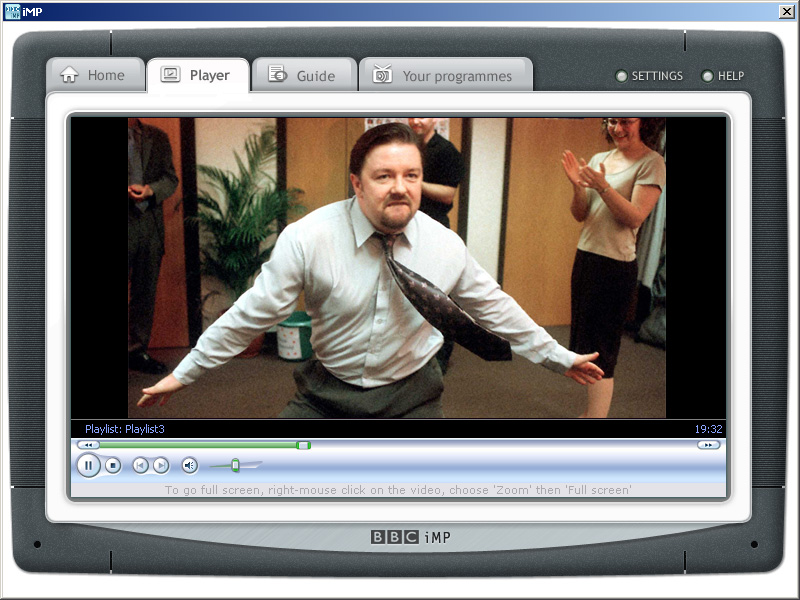BBC iPlayer gets the go-ahead
Series stacking will be limited in scope

The BBC 's governing body has today authorised the launch of the so-called BBC iPlayer, paving the way for on-demand downloads of BBC programmes.
Despite 10,500 submissions from individuals, organisations and protests from other broadcasters, it was always highly likely the BBC Trust would rubber-stamp the scheme. The BBC has already modified the plan to gain Ofcom 's blessing. It has reduced the amount of time programmes are stored down to 30 days and is assuring the public that the iPlayer will be platform agnostic.
"Thanks to the thorough assessment through the Public Value Test (PVT) and with the modifications which resulted from the test and the consultation, the Trust is satisfied that the BBC's new on-demand services will create significant public value with limited market impact," said Diane Coyle, BBC Trustee and Chair of the Trust's PVT Steering Group. "We have therefore given our final approval for the services to be launched."
There was previously much ado from Mac users when it emerged the player would not work with OS X to start with, even though the corporation defined cross-platform compatibility as a definite aim. The final statement from the Trust has now added urgency to this, noting "the strong public demand for platform neutrality".
The Trust now says it will "audit the BBC's progress against this objective every six months and publish its findings."
Speaking at the MIPTV-MILIA event earlier this month, Ashley Highfield, director of the BBC's Future Media and Technology division, said it was the corporation's duty to make the iPlayer universally available.
The second major change from the original proposal regards series stacking - that is, the ability to automatically download the next available episode in a series a la Sky Plus's Series Link. Commercial rivals pleaded for this to be removed "to minimise market impact" says the Trust. But it says it has "taken note of the public's overwhelming support for this feature [and] decided that the facility for series stacking will remain".
Sign up for breaking news, reviews, opinion, top tech deals, and more.
The statement continues to say that the Trust "has applied a 15 per cent annual quota for series stacking". Only certain types of series will be included in the scheme.
On the rise
On-demand programming is rapidly gaining popularity. It's difficult to see how a BBC service would be anything other than wildly successful - providing key programmes are shifted over, of course.
Programmes at Channel 4's 4OD on-demand service have been watched by more than a million viewers since its launch six months ago. "It has definitely taken off," Sarah Rose, head of video-on-demand at Channel 4, told the Financial Times. "We were pleasantly surprised by people's willingness to pay."
As well as free catch-up TV, viewers can also pay 99p for dramas and other archive shows, or pay £1.99 for films. As part of its £20 million forthcoming revamp of ITV.com , the commercial broadcaster is also moving into on-demand services. The new service will add to its live streaming of UEFA Champions League matches.
Many regard the iPlayer's launch as a big test for the BBC Trust, which replaced the BBC governors last year. But in truth the demands already laid down will probably be seen as sufficient, especially with Ofcom already satisfied.
The BBC has faced commercial criticism and reform of its online services before. The 2004 Graf report saw the end of several services which competed with commercial ventures. The corporation still seeks to dispel worry in this area - the Jam education website closed only recently.
At the time Culture Secretary Tessa Jowell said the services would be "more closely aligned to the public service remit of the BBC". Sir Michael Lyons starts as chairman of the BBC Trust tomorrow, and the iPlayer issue is likely to take up a fair proportion of his time over the coming days.
"The over-riding responsibility of the Trust is to act in the public interest. This means that, when considering the potential market impact of new service applications from the BBC, we must focus primarily on the effect on consumers who enjoy the choice offered by content and services beyond those provided by the BBC, concluded Coyle.
Dan (Twitter, Google+) is TechRadar's Former Deputy Editor and is now in charge at our sister site T3.com. Covering all things computing, internet and mobile he's a seasoned regular at major tech shows such as CES, IFA and Mobile World Congress. Dan has also been a tech expert for many outlets including BBC Radio 4, 5Live and the World Service, The Sun and ITV News.